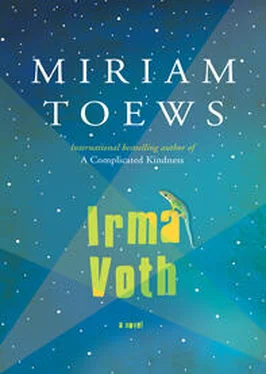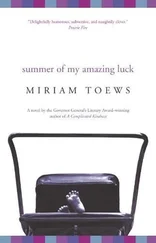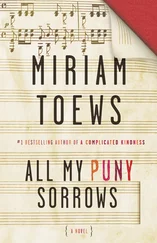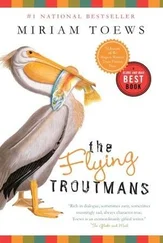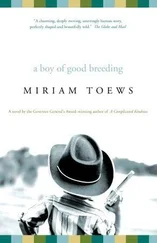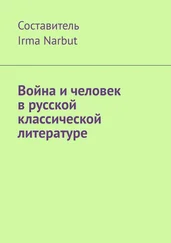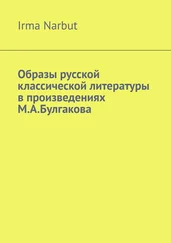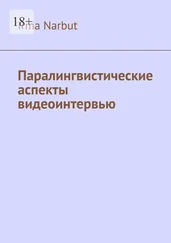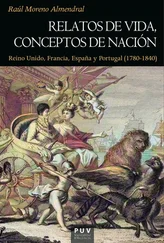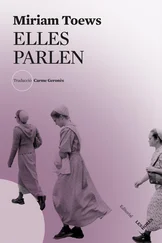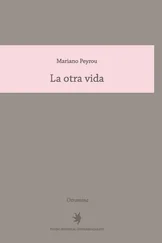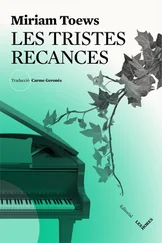That night I took off all my clothes and examined my body. I had forgotten about it. I poked at it like a doctor would and asked myself did I feel this and did I feel that? Then I looked at my face in a small mirror and tried to make the two vertical lines between my eyebrows disappear by stretching the skin away on either side. I brushed my hair until my arms ached and then I draped it over my breasts like Eve when she was being flirty in the Garden.
I still had no power. I couldn’t find the flashlight. The silver eye of God was right outside my bedroom window. I heard music coming from the filmmakers’ house, by now Marijke the German actress would have arrived, and I fell asleep alone and naked in my bed.
The next morning there was a knock on my door. It was a boy wearing narrow black jeans and enormous white sneakers. He said he was Miguel, Diego’s assistant, and I should come to the house immediately. Diego needed to explain things to Marijke before they began shooting and he needed me to help him do that. Miguel was very polite. When you are ready, he said. I told him I had to milk the cows first and he frowned. He asked me if he could help because Diego was already vibrating and we needed to hurry. There are sparks flying off him in every direction, he said.
What’s that? I asked him. He was holding something in his hand.
A two-way radio, he said. Listen. He pushed a button on the radio. He put his finger to his lips.
We heard voices, one in particular.
Who’s that? I said.
It’s Diego, said Miguel. He pointed at the filmmakers’ house.
Is he angry? I asked.
No, said Miguel, it’s a motivational speech.
I told Miguel I’d do my milking fast but alone and be at the house in half an hour. I told him that if Diego needed to tell me things before that he could come see me in the barn and talk while I milked. He could bring Marijke if he wanted to.
Roger, said Miguel. Is that how you say that?
Roger? I asked.
Yeah, in Canada. They said you were from Canada?
I left when I was thirteen, I said. Maybe over and out?
Over and out, Irma, said Miguel.
Okay, I said.
Miguel took off and I stood in the sunshine for a couple of warm seconds trying to think of other coded ways to say yes, I understand, goodbye.
Half an hour later I averted another attack from Oveja by befriending him with wieners and applesauce. For a soldier turned artist he was still surprisingly aggressive.
The filmmakers had tied plastic bags filled with water all around the front porch of their house to keep the flies away. The bags of water sparkled in the sunlight like little chandeliers. I stood outside the door poised to knock while Oveja lay on the ground beside me devouring my leftovers. Then the door opened on its own, well, not on its own but from the inside and all the shouting stopped and Diego came over and kissed my cheek and took me into the huge kitchen to meet the crew.
The house that used to belong to my shy farmer cousins was now inhabited by tattooed artists who lay around smoking and drinking espresso and arguing about politics and camera angles. Diego asked me if I liked the music. I nodded. Have you heard of Tuberculosis? he asked. I nodded again. They’re my favourite band, he said.
One by one they all got up and kissed me on the cheek and introduced themselves to me in Spanish or English or both. I didn’t see Miguel anywhere. Diego explained to me each of their responsibilities. The camera, the sound, other things I had never heard of. We are creating a small world, he said. A world that is more real than the one we know. He told me that he had just discovered that a very important piece of the camera was missing. Show me your thumb, he said. I held it out to him. It’s this small, he said. But it’s the difference between life and death. Can you do your farm work without your thumb? he asked me. I shook my head. I thought of how annoyed Jorge would be if I lost my thumbs. Diego told me that two of the filmmakers, including Miguel, had driven to El Paso to pick up a replacement part that was being sent from Los Angeles.
It’s an old Russian camera from the sixties, he said. It’s difficult to find parts. Now we have to wait for them to come back. It’s excruciating but we must be Zen about it.
I was so nervous. I felt like a moron. I stood there staring at them. I felt conspicuous in my long dress. I could feel the bobby pins from my doak stabbing me in the head. I could smell the cow shit on my shoes. I felt like Jonah after he’d been spit out of the whale onto dry land en route to wicked Nineveh. I didn’t know what to say. There were no women in the house.
Where’s Marijke the German star? I finally blurted out.
Diego whispered in my ear. She’s in her room, crying. Let’s go speak to her now. We walked down the long hallway to the back of the house. There were six or seven bedrooms that we passed to get to the very end. Diego pointed at each bedroom and told me which of the crew it belonged to. Somebody has painted an upside-down cross on mine, said Diego. Irma, did you know that Saint Peter asked specifically to be crucified upside down?
Nope, I said. I looked at Diego and smiled. It was a long hallway that led from Biblical times to the present and back again.
Out of humility, said Diego. To differentiate himself from Jesus Christ. The blood would have pooled in his head. I nodded. But I think, said Diego, that my crew meant it to be the sign of the Antichrist. They’re funny guys.
Marijke had been given my aunt and uncle’s former bedroom, the biggest one. Even the furniture was the same, and the bedding. My cousins had left in a hurry, apparently, and according to my dad it was because Wilf, the older boy, was a narco and about to be eviscerated by some rival narcos. My dad thought everyone who left Campo 6.5 was automatically a narco because why else would they be running away if they weren’t narcos. If my dad’s assessment was accurate this place was teeming with narcos, and not just garden-variety narcos but narcosatanics in search of sensations (like Jorge, allegedly), bored with drinking blood from skulls and poised to bolt for bigger thrills while the rest of us were in it for the long haul, working hard and honestly for very little money, the way God meant for us to be. But I didn’t believe it. I think my uncle got a job selling cars in Canada and Wilf wanted to study the violin and my aunt thought it would be cool to get a perm. But who knows. Maybe they’re a family of drug lords now, throwing bodies out of helicopters and bowling with the heads of double-crossers. That would be my father’s theory.
Marijke was beautiful, strangely beautiful, like Diego had said. Everything about her seemed elongated, firm and far-reaching, like a tower crane or a tall, flightless bird. I imagined cowering under her wing in the rain. She was a Mennonite but she dressed differently than me. She dressed the way I had dressed in Canada, sort of. She had on skinny black jeans, like Miguel’s, and a green T-shirt. She wasn’t crying anymore. She was sitting cross-legged on her bed, on my aunt and uncle’s bed, and smoking a slim Vantage cigarette. Diego greeted her in Spanish and kissed her cheek and she murmured something and smiled at me and asked me, in German, if I was the translator. I told her yes and we shook hands and then Diego said he’d leave us alone to talk.
What did he say? she asked me.
He just said hello, how are you, I said.
He’s very polite, isn’t he? she said.
Yes, I said. She looked around the room and then she walked over to the window and stared out at the yard. She was quiet, looking, and then she turned around and smiled at me again.
How old are you? she said.
Nineteen, I said. How old are you?
Читать дальше
